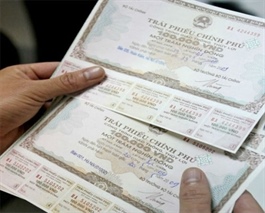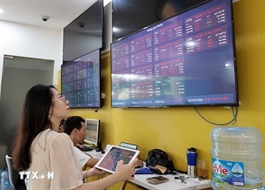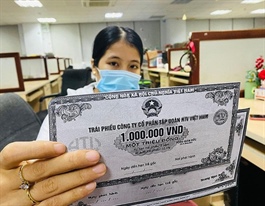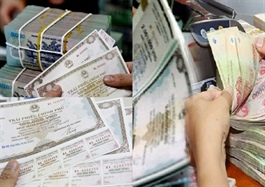Bond issuance mulled as rate duress mounts
Bond issuance mulled as rate duress mounts
Stronger credibility and successful capital mobilisation make now a prime moment to issue USD-denominated bonds for stabilising exchange rate purposes.

One solution is adjusting the central exchange rate upward and allowing a more flexible trading band, Photo: Shutterstock |
On August 13, the central exchange rate, as quoted by the State Bank of Vietnam (SBV), stood at 25,247 VND/USD, marking the third consecutive increase in the central rate, below the record high of 25,249 set on August 1.
Although international developments have placed pressure on the exchange rate, SBV Bovernor Nguyen Thi Hong noted that average lending rates have continued to decline by approximately 0.4 percentage points per annum compared with the end of 2024, reflecting the SBV’s flexible policy management aimed at reducing financial costs for the economy.
“As of now, the VND/USD rate has risen by 2.9 per cent compared with the end of 2024. If pressures continue to intensify, the SBV would consider refraining from further interest rate cuts to avoid undermining exchange rate stability, which could in turn threaten macroeconomic stability,” said Hong at last week’s regular government meeting.
Do Bao Ngoc, deputy CEO of Vietnam Construction Securities, forecasts that from until year-end, exchange rate pressures are likely to persist until the US Federal Reserve begins its interest rate cutting cycle.
“Under the baseline scenario, the Fed could lower rates twice in September and December, and pressure on the USD/VND exchange rate would ease, creating room for the SBV to maintain an accommodative monetary policy stance in support of economic growth,” he said.
In the current context, Ngoc noted that the SBV could temporarily maintain its existing framework, accepting a controlled level of VND depreciation to support exports and growth.
“The SBV may encourage exporters to sell foreign currency, strengthen incentives to attract foreign investment, accelerate the disbursement of approved projects, and extend targeted support to importing enterprises,” added Ngoc. “Another solution is adjusting the central exchange rate upward and allowing a more flexible trading band in the short term, enabling market conditions to be more accurately reflected while minimising the need to draw down foreign exchange reserves, which remain at constrained levels.”
Over the past week, Deputy Prime Minister Ho Duc Phoc issued a clear directive on stabilising the exchange rate and advising on solutions, including the potential issuance of bonds denominated in USD.
Phan Le Thanh Long, founder and director at AFA Group, said there are implications for fiscal and monetary policy, budget revenues and expenditures, foreign exchange reserves, and the exchange rate.
“If capital is mobilised appropriately, this will provide a major boost to the economy in the future, particularly in a context where monetary policy cannot continuously lower interest rates due to concerns over exchange rate pressures,” he said. “Vietnam is accepting a fiscal deficit in order to increase public investment spending and stimulate economic growth. When growth-oriented spending is prioritised, the state budget will come under pressure, and issuing bonds denominated in USD could serve as a means to balance fiscal and exchange rate objectives.”
In terms of creditworthiness, agencies such as S&P, and Moody’s have upgraded Vietnam’s ratings or improved its outlook in recent years, helping to lower the credit risk premium and thus reduce borrowing costs. Nevertheless, Vietnam remains in the speculative grade category, meaning that USD borrowing costs are still relatively high compared to investment-grade benchmarks.
Vietnam has prior experience in successfully mobilising foreign currency capital through issuances in 2005, 2010, and 2014. Notably, the 2014 issuance raised $1 billion in 10-year bonds with a coupon rate of around 4.8 per cent per annum, aimed at debt restructuring, using lower-cost new capital to repay existing debt and was considered a success in the context of improving credit ratings.
Nguyen Minh Tuan, CEO of AFA Capital, noted that Vietnam’s foreign exchange reserves have declined sharply to approximately $85 billion between late 2024 and early 2025, equivalent to about 12 weeks of imports. Therefore, issuing foreign currency-denominated bonds would also help replenish reserves during this period. “The VND has been under depreciation pressure against the USD since the beginning of the year; if this trend persists, the USD debt repayment obligation will rise,” said Tuan. “Issuing USD bonds would enable the SBV to support economic development, manage non-performing loans, and foster sector growth.”
- 08:26 21/08/2025


























